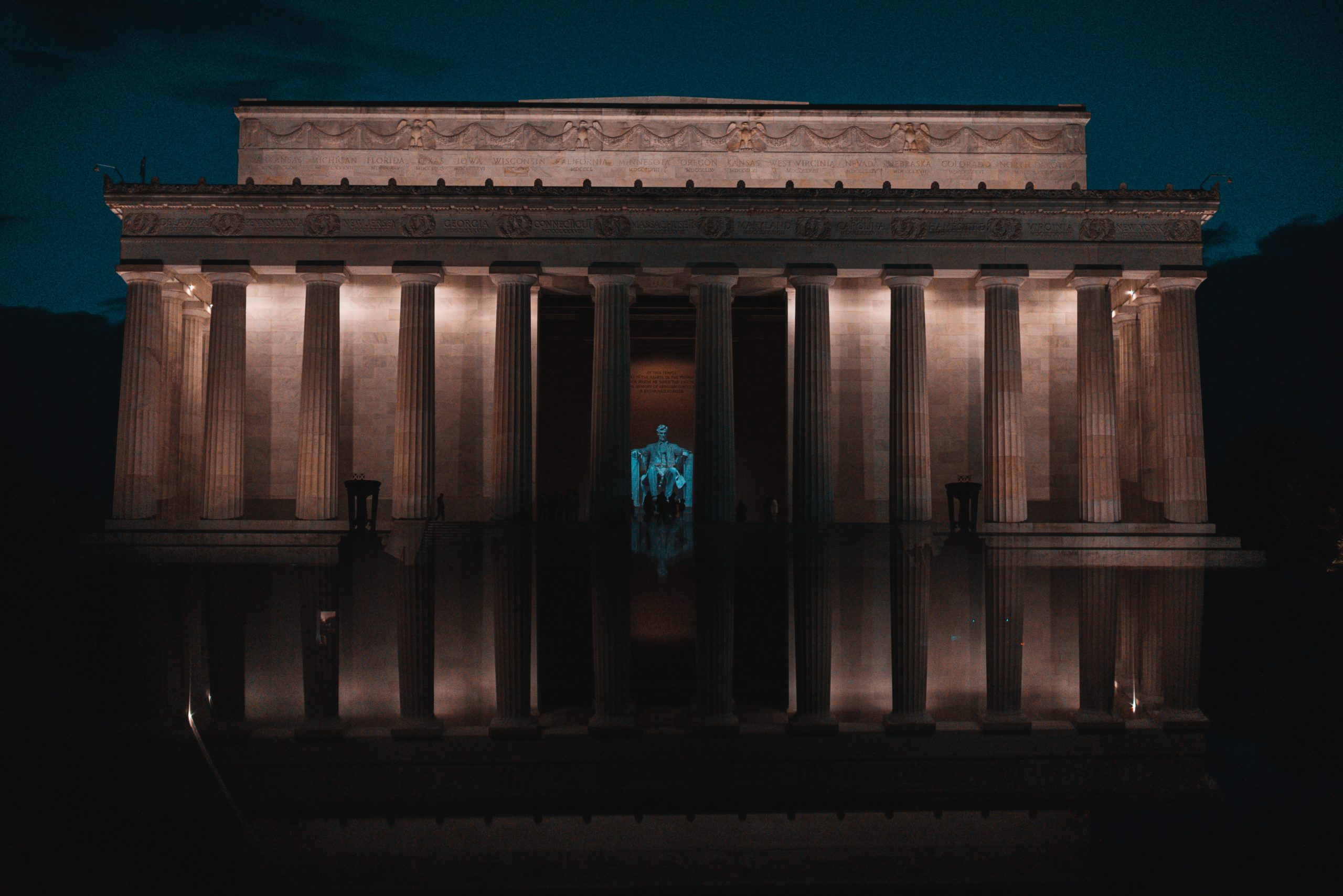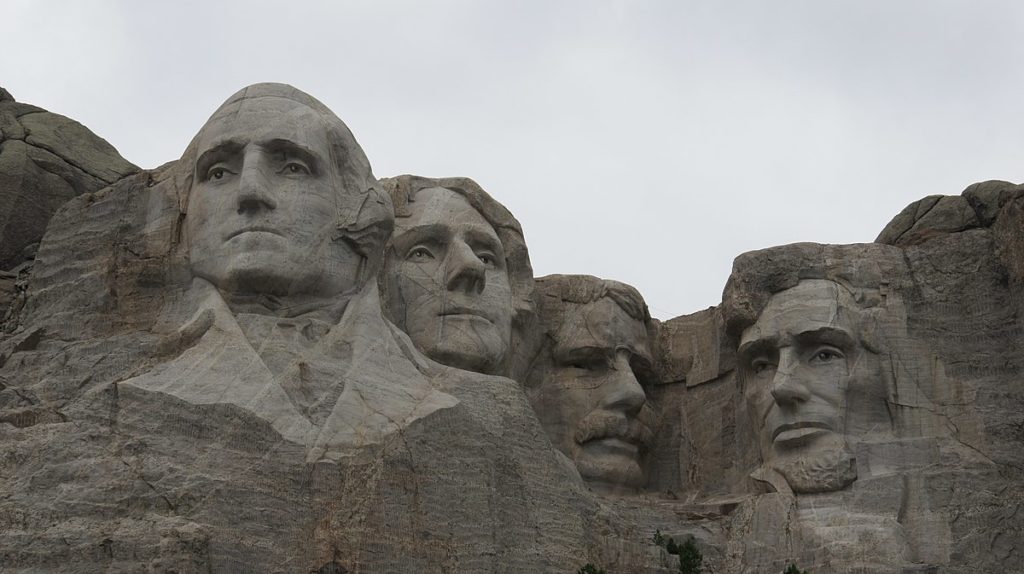
Constitution Day 2020: Human Dignity and the U.S. Presidential Election
Randall A. Poole
Photo by Chris Hardy / Unsplash
This article is part of our “Law, Religion, and the Constitutionalism” series.
If you’d like to check out other articles in this series, click here.
September 17 is designated as Constitution Day to commemorate the signing of the Constitution of the United States in Philadelphia on September 17, 1787. This year, it is especially pertinent that we commemorate the Constitution and reflect on its meaning and importance.1 For their assistance with this essay, I am grateful to Caryl Emerson, A. Watson Armour III University Professor Emeritus of Slavic Languages and Literatures at Princeton University, and to Larry Goodwin, President Emeritus of the College of St. Scholastica.
When people refer to the Constitution, they generally mean not just the letter of the document but also its spirit, its fundamental philosophical principles. A powerful statement of the principles can be found in the preamble to the Declaration of Independence: “We hold these truths to be self-evident, that all men are created equal, that they are endowed by their Creator with certain unalienable Rights, that among these are Life, Liberty and the pursuit of Happiness.” This immortal sentence begins with the challenging concept of self-evident truths. These are truths that are true in themselves, inner truths of reason that do not depend on empirical verification. Human equality is such a truth; empirically, human beings are not equal, since obviously we differ in our abilities. Human equality is based on something deeper — on the intrinsic and infinite worth of every human being, or on human dignity.2For this central idea, eighteenth-century Americans drew especially on the Stoics. See Martha C. Nussbaum’s account, “Equal Worth and Dignity: The Stoic Background,” in her Liberty of Conscience: In Defense of America’s Tradition of Religious Equality (New York: Basic Books, 2008), 76–84.
If human dignity is the ground of human equality and of natural rights, then what is the ground of human dignity? There are two basic approaches to this problem: divine conferral (God confers dignity on all human beings) and human capacities (dignity derives from certain human capabilities).3See Christian Smith, What is a Person? Rethinking Humanity, Social Life, and the Moral Good from the Person Up (Chicago: The University of Chicago Press, 2010), 446–453. In recent decades Amartya Sen, Martha Nussbaum, and others have developed a “human-capabilities approach” to thinking about human well-being, development, and justice. Nussbaum’s theory of justice identifies ten core capabilities to which everyone is entitled because “all ten are necessary conditions of a life worthy of human dignity.” See Nussbaum, “Human Dignity and Political Entitlements,” in Human Dignity and Bioethics: Essays Commissioned by the President’s Council on Bioethics (Washington, D.C., 2008), 351–380, quotation at 351. This valuable collection is available at: https://bioethicsarchive.georgetown.edu/pcbe/reports/human_dignity/index.html. The Declaration’s references to “created” and “Creator” imply divine conferral, and it is noteworthy that the Declaration also implies that the existence of God is itself a self-evident truth. The human-capacities (or capabilities) approach grounds human dignity in human nature, typically in the capacity for self-determination (Kantian autonomy or “practical reason”), or in the remarkable dual power of reason: first, to recognize or posit ideals and, second, to determine the will according to them.4 In Kant’s famous formulation, autonomy is “the ground of the dignity of human nature and of every rational nature.” See Kant, Groundwork of the Metaphysics of Morals, in Kant, Practical Philosophy, trans. and ed. Mary J. Gregor, intro. Allen Wood (Cambridge: Cambridge University Press, 1996), 85. “Practical reason” is the sixth of Nussbaum’s ten core capabilities. Nussbaum, “Human Dignity and Political Entitlements,” 378. (The three supreme ideals or “transcendentals” are truth, beauty, and the good.) In simplest terms, we might say that the source of human dignity is the potential that everyone has to do good. It follows that the goal of a just society is to create the conditions in which everyone can realize, as much as possible, their capacity to do good.5 The divine-conferral and human-capacities approaches to grounding human dignity are not incompatible. The capacity for rational self-determination is a type of ideal causation and, as such, it cannot be explained naturalistically. Therefore it would seem to have metaphysical or theistic implications. This is Kant’s approach: the human sources or grounds entail the “metaphysical postulate” of theism. Starting with the human-capacities approach (which taken by itself is open to the criticism that not all human beings have the specified capacities and no one has them at all stages of human life), we can get to divine-conferral. Together the two approaches help to surmount the problems of either taken by itself.
In varying degrees, the Founding Fathers appreciated the gap between their ideals and the social reality of colonial America, especially between the ideals of equality and dignity on the one hand, and the reality of slavery on the other. They knew, to varying degrees, that the state of their society contradicted their ideals, and they appreciated the enormous work that lay ahead in building a more just and equitable society. Working to bring social reality ever closer to the ideals of human equality and dignity was the project that founded the new nation. The project continues today. The project is about progress (“a more perfect Union”). The Constitution provides the institutional framework (our system of government) for progress according to the founding ideals of the American republic. It is worth pausing over the meaning of American progress: Striving for the type of society in which everyone — human dignity includes everyone — is able to pursue happiness (a concept originally understood not as pleasure, contentment, worldly success or even peace of mind but as the fulfilment of one’s potential), to lead a rich and fulfilling human life, and to do good. We remain far from this type of society, and what progress we have made toward it has been uneven. Racism, in particular, still casts its dark shadow over the land.
The founding ideals of the American republic are often referred to as “liberal democratic.” The term might suggest that they are the province especially of the Democratic Party. That is not so. They might as well be called “conservative” because they are our constitutional ideals.
In his or her oath of office, the president swears (or affirms) that he or she will preserve, protect and defend the Constitution of the United States. It is clear that this means, first of all, defending the principles of human dignity and equality. Someone who showed contempt for these principles by routinely degrading and dehumanizing others would be fundamentally unfit for office.
The U.S. Constitution enshrines the liberal democratic principle of the rule of law. This principle holds that the purpose of law is to defend human dignity and the natural rights associated with it by limiting the arbitrary power of one person over another. Law equalizes human relations. Without it, those who would brutalize others are free to do so — also further brutalizing themselves in the process. In short, law enables people to develop as persons. A constitutional republic such as the United States is distinguished from other forms of government, because in it state power is itself limited by law and is to be used only for public purposes — for the good of the people. Officials at every level of government, from the police to the president, are authorized to exercise state power, but they must exercise it lawfully. Because the president is the head of state, presidential abuse of power is especially subversive of the rule of law.
The right to life includes the right to a dignified life from birth to death, entailing a shared moral commitment to providing the social, economic, and environmental conditions necessary for human flourishing.
There is another ideal that underlies the U.S. Constitution — the ideal of truth. Of course truth is not a straightforward law like gravity, which goes into effect when you drop something; truth is a complex ideal that takes work to realize. But still it is an objective reality. Today, the assault on the concept of truth represents potentially the greatest danger our society has ever faced. By its nature, truth is universal and one. People may disagree over the truth, but their disagreement is over the truth. To suggest that you have your truth and I have mine is to dispense with the very concept. Truth refers to a reality, independent of oneself, that can be known. Like law, reality and the truth about it impose certain limits on us. We cannot do anything we want. Reality stands in the way. That is one reason why unscrupulous people lie: by distorting other people’s understanding of reality, or by insisting that all realities are equally true and untrue (“alternative facts”), they hope to impose their will on others. Truth, like law, limits the power of one person over another. It protects human dignity. As one of the ideals that drives self-determination, it goes to the very heart of personhood. The totalitarian regimes of the twentieth century undermined truth and sought to create a false sense of reality, or even to destroy any sense of reality, precisely in order to remove the last limits on their power.6 See generally, Hannah Arendt, The Origins of Totalitarianism (1951). Distorting the truth has another consequence: it impedes our ability to make reality better, since to improve something, we first need to know its current condition. Progress depends on truth.
The Declaration of Independence proclaims the right to life. Many people of good conscience believe that the right to life begins at conception. However, the pro-life cause must not be defined exclusively or narrowly in terms of overturning Roe v. Wade. Rather, a true pro-life ethics must respect and protect the dignity of all people, at all stages of life. This is the broader type of approach taken by Catholic social teaching, which holds that the right to life includes the right to a dignified life from birth to death, entailing a shared moral commitment to providing the social, economic, and environmental conditions necessary for human flourishing — for truly honoring all people as children of God. ♦

Randall A. Poole is Professor of History at the College of St. Scholastica and a Fellow of the Center for the Study of Law and Religion at Emory University. His most recent book will be published this fall: The Oxford Handbook of Russian Religious Thought, co-edited with Caryl Emerson and George Pattison.
Recommended Citation
Poole, Randall A. “Constitution Day 2020: Human Dignity and the U.S. Presidential Election.” Canopy Forum, September 7, 2020. https://canopyforum.org/2020/09/07/constitution-day-2020-human-dignity-and-the-u-s-presidential-election/


